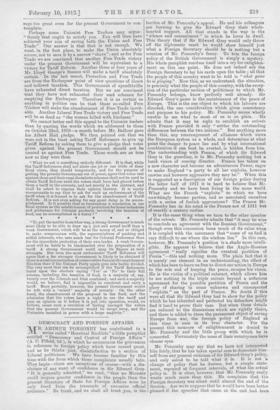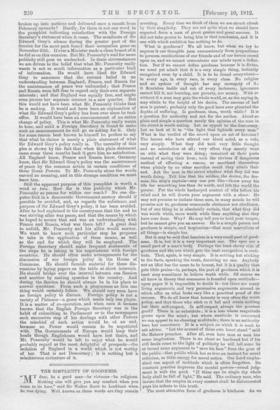DEMOCRACY AND FOREIGN AFFAIRS.
Air R. ARTHUR PONSONBY has contributed to a series called "Heretical Booklets" a little pamphlet entitled "Democracy and Control of Foreign Affairs" (A. C. Pifield, 3d,), in which he enumerates the grievances in reference to foreign policy which have caused great, and as he thinks just, dissatisfaction to a section of Liberal politicians. We have become familiar by this time with the form which these complaints usually take. They begin—there are exceptions of course—with a dis- claimer of any want of confidence in Sir Edward Grey. "It is generally admitted," we read, "that no Minister could inspire greater confidence in the people than the present Secretary of State for Foreign Affairs were he only freed frorn the trammels of excessive official reticence." Be frank, and we shall all trust you, is the series called "Heretical Booklets" a little pamphlet entitled "Democracy and Control of Foreign Affairs" (A. C. Pifield, 3d,), in which he enumerates the grievances in reference to foreign policy which have caused great, and as he thinks just, dissatisfaction to a section of Liberal politicians. We have become familiar by this time with the form which these complaints usually take. They begin—there are exceptions of course—with a dis- claimer of any want of confidence in Sir Edward Grey. "It is generally admitted," we read, "that no Minister could inspire greater confidence in the people than the present Secretary of State for Foreign Affairs were he only freed frorn the trammels of excessive official reticence." Be frank, and we shall all trust you, is the burden of Mr. Ponsonby's appeal. He and his colleagues are burning to give Sir Edward Grey their whole- hearted support. All that stands in the way is the "silence and concealment" in which he loves to dwell. This theory that if Sir Edward Grey would only throw off the diplomatic mask he would show himself just what a Foreign Secretary should be is nothing but a creation of Mr. Ponsonby's fancy. To him the foreign policy of the British Government is simply a mystery. His whole pamphlet resolves itself into a cry for enlighten- ment on this one point. He does not indeed ask the Foreign Secretary to lay his cards upon the table ; all that the people of this country want to be told is "what game he is playing." Now this, as we understand the situation, is precisely what the people of this country, with the excep- tion of the particular section of politicians to which Mr. Ponsonby belongs, know perfectly well already. Sir Edward Grey's game is the maintenance of the peace of Europe. That is the one object to which his labours are directed, the one consideration which gives consistency and purpose to his policy. Mr. Ponsonby seems wholly unable to see what to most of us is so plain. He admits that it may be right to establish an entente with France provided it only "settles the outstanding differences between the two nations." But anything more than this, any rearrangement of alliances which views the European system as a whole, and determines at what point the danger to peace lies and by what international combination it can best be averted, is hidden from him. The understanding with France, of which Sir Edward Grey is the guardian, is to Mr. Ponsonby nothing but a lurid vision of coming disaster. France has taken on a new character and become an adventurous Power, eager to make England "a party to all her exploits, however unwise and however aggressive they may be." When this is suggested as a description of our foreign policy during the latter half of 1911 it is hard to believe that Mr. Ponsonby and we have been living in the same world. What aro the French "exploits" to which we have unwittingly become parties, and so associated ourselves with a series of foolish aggressions ? The France Mr. Ponsonby has in his mind is the France not of 1011 but of exactly a century earlier.
It is the same thing when we turn to the other member of the entente. Mr. Ponsonby admits that" it may be wise to conclude an agreement with the Russian Government," though even this concession loses much of its value when it is coupled with the assurance that "some of us find it very difficult to see where the wisdom lies." In this case, however, Mr. Ponsonby's position is a shade more intelli- gible. He appears to believe that the Anglo-Russian agreement "really signifies the eventual partition of Persia "—this and nothing more. The plain fact that it is merely one element in an understanding, the effect of which has been to leave us free to direct our action in Europe to the sole end of keeping the peace, escapes his vision. He is the victim of a political cataract, which allows him to see nothing in the triple entente beyond a nefarious agreement for the possible partition of Persia and the glory of sharing in some unknown and unsuspected " exploits " on the part of France. No doubt if this wore all that Sir Edward Grey had to show for the policy which he has inherited and perfected his defenders might find it hard to prove their case. But when these details are reduced to the dimensions which are rightly theirs, and there is added to them the paramount object of saving Europe from war, the foreign policy of England at this time is seen in its true character. For the present this measure of enlightenment is denied to Mr. Ponsonby and the little group with which be is connected. Fortunately the mass of their countrymen have clearer eyes. Mr. Ponsonby may say that we have not interpreted him fairly, that he has taken special care to dissociate him- self from any general criticism of Sir Edward Grey's policy, and only asked to be told what it is. It is not a change of policy that he desires, but a simple state- ment, repeated at frequent intervals, of what the actual policy is. It is clear, however, that Mr. Ponsonby really wants much more than this. He complains that the Foreign Secretary was silent until almost the end. of the Session, Arc we to suppose that he would have been better pleased if the speeches that came at the end had been broken up into sections and delivered once a month from February onwards ? Hardly, for there is not one word in the pamphlet indicating satisfaction with the Foreign Secretary's statement when it came. The assailants of Sir Edward Grey's silence during the greater part of the Session for the most part found their occupation gone on November 28th. If ever a Minister made a clean breast of it he did so on this occasion. But Mr. Ponsouby's wail for more publicity still goes on unchecked. In these circumstances we are driven to the belief that what Mr. Ponsonby really wants is not so much information as a particular kind of information. He would have liked Sir Edward Grey to announce that the current belief in an understanding between England, France, and Russia for the maintenance of peace was unfounded ; that France and Russia were left free to regard only their own separate interests ; and that England was equally free, and might even pursue her separate interest in a new quarter. But this would not have been what Mr. Ponsonby thinks that he is seeking. It would not have been an explanation of what Sir Edward Grey's policy has been ever since he took office. It would have been an announcement of an entire change of policy. This is what Mr. Ponsonby really wants to bear, and until a Foreign Secretary is found to make such an announcement he will go on asking for it. Only for some reason best known to himself he prefers to say that what he claims is merely a plain statement of what Sir Edward Grey's policy really is. The unreality of this plea is shown by the fact that when this plain statement came some three months back it gave him no satisfaction. All England knew, France and Russia know, Germany knew, that Sir Edward Grey's policy was the maintenance of peace by the common action in certain conditions of three Great Powers. To Mr. Ponsonby alone the words carried no meaning, and in this strange condition we must leave him.
Still the apparent purpose of this pamphlet is worth a word or two. How far is this publicity which Mr. Ponsonby so yearns for within our reach ? No one dis- putes that in a democratic Government secrecy should if possible be avoided, and, as regards the substance and purpose of Sir Edward Grey's policy, it has been avoided. After he had explained to his countrymen that the end he was striving after was peace, and that the means by which he hoped to secure that end was an understanding with France and Russia, what was there left ? A great deal to unfold, Mr. Ponsonby and his allies would answer. We want to know each particular step he proposes to take in the application of these means, as well as the end for which they will be employed. The Foreign Secretary should make frequent statements of the steps he is taking in his negotiations with foreign countries. He should often make arrangements for the discussion of our foreign policy in the House of Commons. He should furnish material for those dis- cussions by laying papers on the table at short intervals. He should bridge over the interval between one Session and another by making speeches in the country. And during the Session he should always be in his place to answer questions. From such a programme as this one thing would certainly follow. We should very soon have no foreign policy to discuss. Foreign policy is not a variety of Patience—a game which needs only one player. It is a matter of co-operation, and when once it became known that the English Foreign Secretary was in the habit of submitting to Parliament or to the newspapers each successive step of his dealings with other Powers the mischief of such action would be at an. end, because no Power would remain to bo negotiated with. The Governments of Europe would keep their heads though Englishmen would have lost theirs, and Mr. Ponsonby would be left to enjoy what he would probably regard as the most delightful of prospects—the isolation of England in a world which is not worthy of her. That is not Democracy ; it is nothing but a mischievous caricature of it.











































 Previous page
Previous page